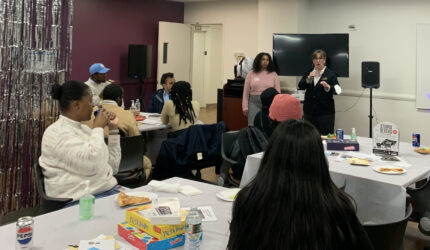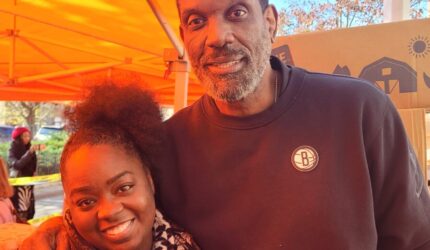Navigating college is hard enough for the average student, but for first-generation college students, the challenges of finding connections and financial aid paperwork are even bigger without as much parental support or prior experience in the workplace.
For CUNY SPS students, the First-Generation Student Success Series helps students get access to resources they might not otherwise know about, and provides a platform for them to speak about their experience through virtual discussions. The program was first developed in Fall 2021 by Dr. Elizabeth Alsop, assistant professor in the Communication and Media program, and Dr. Carla Marquez-Lewis, academic director of the Psychology program.
On November 9, the series continued with a virtual student focus group via Zoom led by Dr. Alsop, Dr. Marquez-Lewis, and Lisa Sheridan, CUNY SPS marketing assistant. The workshop gave first-gen CUNY SPS students a chance to share their feedback on existing services, and offered suggestions about additional resources or programming they’d like to see.
One of the main barriers for first-gen students is the lack of professional connections that other students could have an easier time making, Dr. Alsop said during the meeting.
“As a first-gen student, the thing that you suffer from the most is the lack of connections, and the lack of access to people who are in high positions of power,” she said.“This whole idea about who you know, it’s not just Hollywood, right? It’s kind of everything.”
To overcome this issue, Dr. Marquez-Lewis suggested multiple solutions, including a first-gen support group to help students connect with one another, as well as a first-gen seminar, an actual class where students can formally learn about the ins and outs of the CUNY system and speak with first-gen professionals who have already navigated the professional world.
“I did well academically K through 12, but no one ever told me which jobs line up to which majors,” one student said. “I was a liberal arts major in undergrad. There’s so many jobs I didn’t know existed, and how to be successful to get them. Because my parents are blue collar, I did not know what you major in to get these [jobs].”
Another hurdle is the lack of resources for figuring out college applications, another student said.
“When I was an undergraduate…my parents didn’t understand what FAFSA was at all, and my mom’s an immigrant, so she didn’t understand,” the student explained. “And my parents told me flat out ‘We’re not paying for college.’ But the paperwork is not always accessible for somebody who is, at that time, a high school student.”
Another student, Heaven-Lee Searles, who is pursuing a BA in Psychology, suggested a peer mentorship program in which a student close to graduating is paired with a first-gen student for academic and career advice.
“I’m kind of nervous about the capstone [project],” Searles said. “I don’t know what to expect, but if I had someone to talk to who already did it, just so they can let me know what to expect, I think that would be helpful.”
As a final piece of advice, Sheridan encouraged students to apply for the First-Generation Student Success Scholarship, which awards up to $500 based on financial need and merit for first-gen students.





